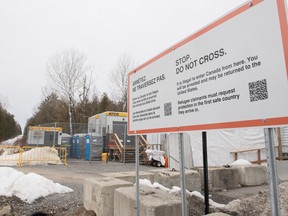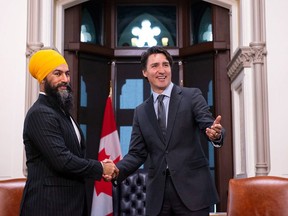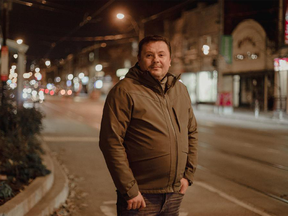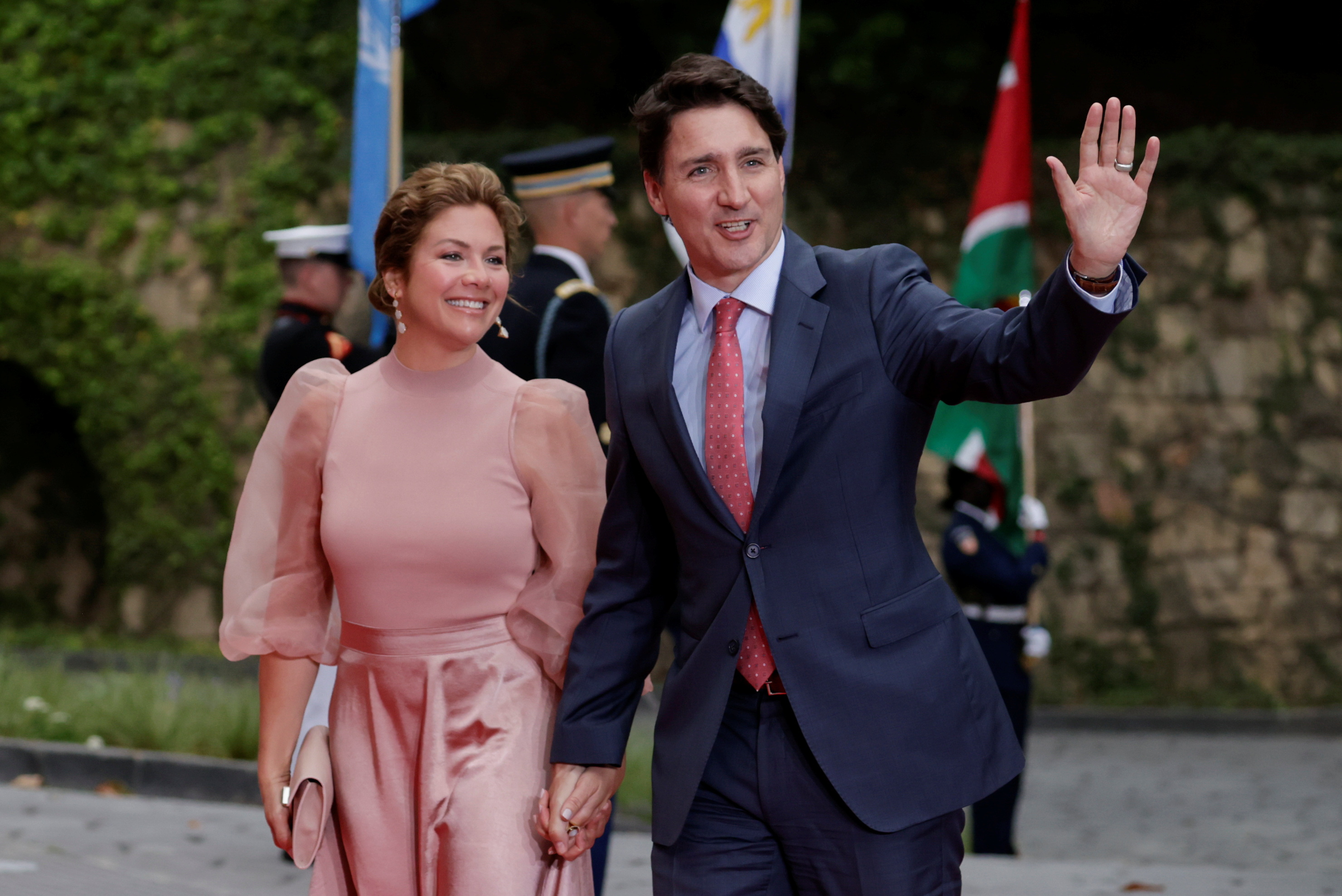We are a true Nationalist organization that wants to preserve our heritage, culture and traditional values through reforms to reflect our true Canadian core identity. A moratorium on all immigration, stopping third world immigration, a new immigration policy for a return to Canada's traditional ethnic demographics of Euro-Canadian pioneer settlers and Natives. Equal rights, eliminating affirmative action, discrimination against Euro-Canadians and an end to minority group special privileges.
Thursday, December 14, 2023
False Hate Crime conviction is being appealed, I was wrongly accused on trumped up charges by CAHN Richard warman
https://www.thepeterboroughexaminer.com/news/crime/the-message-was-clear-he-hates-gay-people-peterborough-white-nationalist-guilty-of-uttering-death/article_5c967a35-37a8-5980-a1a8-ab8abe5c0dfb.html
Sunday, December 10, 2023
Some Ukrainian immigrants leaving because it's so expensive
(It is pretty bad when actual valued European immigrants that we actually want and deserve to stay in Canada want to leave because its so bad now because of the mass immigration and the Turd Worlders that are burden on system and do not work.)
Some Ukrainian immigrants leaving because it's so expensive
High housing costs and underemployment among challenges
Not long after Russia began bombing Ukraine, Oleksii Martynenko packed his bags and fled Kremenchuk, a once-tranquil but now war-torn city roughly 190 miles (300 kilometres) from Kyiv. He moved to Stockholm and took a job as a line cook. One year later, as his work visa approached expiry, he relocated to Canada’s largest city.
The continental change of scenery proved challenging for the Ukrainian immigrant. It took Martynenko about two months to find a comparable job in Toronto’s bustling downtown, about an hour’s commute from his apartment in the city’s suburbs. It wasn’t enough to pay the bills, so he soon took a second job, also as a line cook, and now works seven days a week in fast-paced kitchens.
The strenuous work and high cost of living has taken its toll. Martynenko, 44, is now planning a return to Sweden. His monthly expenses in Toronto include roughly $100 for a phone plan , $150 for public transit, $400 for groceries, and $1,000 for a room in a rooming house, where the kitchen and bathroom are shared among four tenants. Any money left over is sent back to family still in Ukraine. At least in Stockholm he earned enough to have savings, he said.
“I’m tired all the time now,” Martynenko said in an interview. “I want to go back to Europe because it’s such a difficult life in Canada.”
Canada has long been a choice destination for newcomers seeking a better life in a prosperous nation. Nearly a quarter of all Canadians are immigrants and the country has welcomed nearly 200,000 Ukrainians since the war’s outset. But the daily grind of life in Canada’s busiest metropolises — not just Toronto but also Vancouver, Montreal and Calgary — along with soaring costs is making it increasingly hard to get by.
Trudeau’s ambitious plans
Social service organizations have warned that the country’s most vulnerable citizens — often newcomers — are affected most by higher prices, especially in housing. Andrei Zavialov, a settlement worker with Ukrainian Canadian Social Services Toronto, said he knows of at least 15 Ukrainians who have returned to their home country from the Greater Toronto Area since the war broke out. There isn’t one predominant reason for leaving, he said, but expenses are among the most cited factors.
“An individual becomes unable to find money, but they need to pay for very high rent, groceries,” said Zavialov. “And such expenses hit an immigrant’s pocket strongly. No job, no money, they return to Ukraine where everything is familiar.”
Anecdotal stories like these are supported by new research suggesting that more newcomers have chosen to leave Canada in recent years as worsening housing affordability, a strained health-care system, and underemployment spark disillusionment with the opportunities the country offers.
An acceleration of that trend would undermine Prime Minister Justin Trudeau’s ambitious plans to stave off economic backsliding through relaxed immigration policies. Like many developed countries, Canada’s birthrate is declining and the population would shrink were it not for new arrivals. Real gross domestic product per capita has stagnated over the past decade, while soaring home prices have far outpaced disposable income.
The Trudeau government’s solution is a target of roughly half a million new permanent residents a year, on top of a recent boom in arrivals that pushed Canada’s annual population growth rate to 2.7 per cent in 2022, the fastest pace among advanced economies.
The challenge now is retaining them. Newcomers have to navigate a web of problems, starting with housing costs. Even smaller Canadian cities are facing tight rental supply as higher interest rates have discouraged would-be buyers, creating fierce competition for rental units. The average cost of rent in Canada hit a record $2,149 in September, up more than 11 per cent from a year prior, according to research firm Urbanation. In Toronto, it was $2,614, which represents almost the entire pretax income of a person working full-time for minimum wage.
Other costs are also rising. While inflation is decelerating, it’s still running at 3.8 per cent, “much too high for comfort,” according Benjamin Reitzes, a rates and macro strategist at the Bank of Montreal. Grocery costs increased 5.8 per cent annually in September, while gas prices jumped 7.5 per cent.
To be sure, many newcomers are keen to stay in the country. Zavialov said most Ukrainian newcomers he’s interacted with have expressed strong admiration for Canada — its diverse population, socialized health-care system and fraying but still-strong social net. The decision whether to return to Ukraine or stay in Canada is also inspired by factors beyond expenses — proximity to war, safety, or a sense of patriotic duty.
‘Want to help my country’
A combination of those considerations prompted Anna-Maria Lyakhovetska to plan a return to Ukraine as soon as it’s safe. The 17-year-old moved to Germany after her father died in the war, and then relocated to Canada, arriving in Toronto just seven months ago. Now she wants to go back, in part to escape the hurdles of life in a new country and in part to aid the war effort. Russia’s invasion, she said, encouraged her to pursue a career in political organizing.
“It’s expensive living here,” she said. “But I also want to go back to help my country.”
The bulk of Canada’s Ukrainian immigrant intake is clustered in Ontario, the country’s most populous province, according social services group Operation Ukrainian Safe Haven. Based on financial assistance data, 40 per cent of recent Ukrainian immigrants have settled in Ontario while 21.4 per cent landed in Alberta and 10.3 per cent went to Manitoba.
Oleksandr Halyk, 50, arrived in Canada with his 25-year-old son in March, directly from Ukraine. An engineer back home, he took a job as a cabinet maker in north Toronto because he lacked a convertible degree. His son, meanwhile, found a better paying job at an airport.
https://financialpost.com/news/economy/canada-expensive-ukrainian-immigrants-leaving
Monday, November 20, 2023
Trudeau's open immigration policies are becoming a problem for Americans
Trudeau's open immigration policies are becoming a problem for Americans
Increasing number of illegal migrants, drug smugglers using Canada as backdoor entryway into U.S.

The foolish immigration policies of Prime Minister Justin Trudeau’s Liberals and their NDP backers have burdened Canada’s health-care system, inflated housing costs and are now starting to annoy Washington.
America’s immigration problems at its southern border are nightmarish by comparison, but some members of Congress have also voiced concerns that their northern border with Canada has become a backdoor entry into the United States for increasing numbers of illegal migrants and drugs.
Over two dozen Republicans formed a northern border security caucus earlier this year, which intends to identify and quantify the problem at the U.S.-Canadian border. In recent years, the surge in refugee claimants from the U.S. into Canada, via Roxham Road (closed in September) in rural Quebec, has been the biggest bilateral immigration issue and led to a new asylum pact with the U.S.
“What’s gotten less attention is the exponential surge in migration going the other way,” wrote Alexander Panetta, the CBC’s Washington correspondent. The northern border caucus is calling for more border agents and monitoring equipment, all of which will slow border crossings for those headed to the United States from Canada.
Remote areas are most affected. “We are being assaulted because we don’t have a border,” said Rep. Ryan Zinke of Montana. “This is a national security problem and the northern tier has their own set of challenges.”
Americans have also complained about visa requirements for Mexicans who wish to enter Canada. Mexicans can fly and enter Canada if they obtain an eTA, or an online visa waiver, which entitles them to stay for up to six months. An unknown number are smuggled into the United States by vehicle.
Fox News reported in February that, “There has been a sharp increase in Customs and Border Protection (CBP) encounters of migrants at the northern border, jumping from 32,376 in FY 2020 to 109,535 in FY 2022. There have also been more recent increases in drug seizures, all while staffing levels have remained roughly static for years. The border, which is 5,525 miles, only has 115 ports of entry.”
According to Rep. Mike Kelly, “Migrants and smugglers are seeking alternative routes into the United States, and the northern border is increasingly their first stop.”
The CBC reported that, “Statistics from U.S. Customs and Border Protection show exponential growth in migration from Canada, with more than 55,000 encounters in the first four months of this fiscal year — almost eight times the 2021 rate.
“These encounters can include anything from an arrest to an asylum claim, and they’ve disproportionately involved citizens of India, Mexico and Canada.”
That’s a small amount compared to the flood of illegals getting across America’s southern border, but as controls along the Mexican border increase, migrants and drug smugglers will increasingly turn to Canada to bypass U.S. immigration controls.
The Americans don’t realize that Ottawa’s immigration system needs a complete overhaul. Toronto and Vancouver are being flooded with newcomers who are overwhelming hospitals and homeless shelters, and driving up real estate prices. Visa-free travel for Mexicans is a loophole that must be closed. And Canada’s loose student visa rules must be tightened immediately.
This growing controversy adds to the list of immigration problems that Trudeau has imposed on Canadians. Young people cannot afford to buy homes, older people cannot get family physicians and Canada has become a backdoor entry into the U.S. for illegal immigrants, criminals and drugs.
Financial Post
https://financialpost.com/diane-francis/trudeau-open-immigration-policies-problem-americans
Tuesday, November 14, 2023
Anti-White Communist art exhibit in Hongcouver
Anti-White Communist art exhibit in Hongcouver where you can use their Aryan recognition tool to compare your facial measurements to leaders of the Third Reich.
Vancouver Art Gallery has a new anti-white exhibit: Conceptions of White The exhibit tells white people to stop talking, enjoy discomfort, check their privilege, and vocalize their ignorance The gallery received $29 MILLION last year from the Canadian government
https://tnc.news/2023/11/08/shepherd-vancouver-art-gallerys-anti-white-exhibit/
https://app.aryan.tools
Saturday, November 11, 2023
No More Brother Wars! Lest We Forget! Remember them all!
Monday, September 11, 2023
Diane Francis: Co-captains Trudeau and Singh running Canada into the ground
"Under Trudeau, Canada is unable to accommodate the high immigration targets of his government"
Diane Francis: Co-captains Trudeau and Singh running Canada into the ground
This lack of smart leadership is why Canada slowly sinks
Published Sep 11, 2023

The Good Ship Canada is taking on water, and bringing in far too many unproductive crew, and its Captain Justin Trudeau simply re-arranges the deck chairs.
Suddenly, Canada’s economy contracted in the second quarter this year and heads toward a recession, the first high-income country to do so. Canadians threaten to mutiny — a recent poll showed that a majority want Trudeau and his governing sidekick, Jagmeet Singh, out of office.
“Canada is one of the only high-income countries yet to economically rebound from the COVID recession. Average income per person in Canada (adjusted for inflation) was $55,677 in the first three months of this year compared to $56,183 at the end of 2019. We’re poorer today than we were three-and-half years ago despite the avalanche of federal government spending and borrowing,” concluded the Fraser Institute in a July report.
Under Trudeau, Canada is unable to accommodate the high immigration targets of his government, thanks to inflation, higher interest rates, unaffordable housing prices, and a health care crisis. Many Canadians do not have a family physician and cannot get doctors’ appointments for months, a problem worsened by a growing population.
Unfortunately, Canadians could be stuck with the ruling trust fund duo until 2025, when their coalition deal ends. So Trudeau busies himself with giving MPs raises in pay plus creating the country’s biggest, overpaid cabinet in history. He now has 38 in place, none of whom have expertise in the domain over which they preside. (The U.S. has a cabinet of 25 and Australia of 20.)
Instead of drumming up trade, such as cashing in on supplying LNG to India or China so they can transition from dirty coal, he headed off to the G20 meeting in India to raise the issue of foreign interference by Sikh radicals in Canada with Prime Minister Narendra Modi. Trudeau’s approach to this issue insulted India, and may be why he was unable to get a bilateral summit with the Indian leader. If he was pitching LNG or investments, he’d rise to the top of the list, but that’s out of the question, and this year Trudeau has nixed proposals worth billions made by Japan, Germany, and Spain to build gas liquefaction and export plants in Canada.
This lack of smart leadership is why Canada slowly sinks. “The Organisation of Economic Cooperation and Development (OECD), a 38-member international organization, predicts that Canada will be the worst-performing advanced economy from 2020 to 2030, with inflation-adjusted per-person GDP growth of only 0.7 per cent per year over the decade. The same is true from 2030 to 2060,” the Fraser Institute’s July report notes.
In March, the Fraser Institute estimated the federal deficit will reach $40 billion in 2023, or $10 billion higher than forecasted, and that there is no plan to balance the budget.
In May, a report by Canada’s housing agency, the Canada Mortgage and Housing Corporation (CMHC), said high household debts (due to high mortgages as a result of high housing costs) put the economy at more risk going forward. “Canadian households are more in debt than those in any other G7 country, and the amount they owe is now more than the value of the country’s entire economy,” the CBC reported.
The CMHC’s deputy chief economist warned that “Canada’s very high levels of household debt — the highest in the G7 — makes the economy vulnerable to any global economic crisis. When many households in an economy are heavily indebted, the situation can quickly deteriorate, such as what was witnessed in the U.S. in 2007 and 2008.”
Even so Canada’s Minister of Finance Chrystia Freeland said in July “I think we can be really optimistic about the Canadian economy. Canada had the strongest economic growth in the G7 over the course of 2022.”
With mentality like that Canada heads for the shoals. In 2015, Trudeau promised modest budget deficits and balanced budgets by 2019. Instead, he’s spent like a sailor: Compensation paid to federal employees increased 52 per cent, from $38 billion in 2015 to $58 billion in 2021. Federal employment job growth is three times greater than in the private sector and, at the same time, management fees paid to consultants have skyrocketed from $10.4 billion when the Liberals took office, to an estimated $17.7 billion in 2022, a jump of nearly 60 per cent.
Franco Terrazzano, director of the Canadian Taxpayers Federation, nailed it when he recently wrote, “this government doesn’t care about fiscal prudence or helping taxpayers.”
This is why Canada’s co-captains must be dumped ashore as soon as possible.
Financial Post
https://financialpost.com/diane-francis/co-captains-trudeau-singh-running-canada-ground
Thursday, August 24, 2023
Food bank reports 95% of users not born in Canada
Food bank reports 95% of users not born in Canada
A Toronto-area food bank is sounding the alarm after it witnessed a dramatic increase in new clients – a vast majority of which were new immigrants.
According to Feed Scarborough, visits to its five locations across the region have spiked by 112% in the past year.
A total of 95% of those relying on Feed Scarborough were not born in the country, while 72% had only been in Canada a year or less.
“I can’t pay the bills. I don’t have any money. I don’t have any income, but I’m still surviving,” client and new immigrant Brigitte told CityNews.
“The situations I’ve passed through, the things I’ve passed through have been a lot, and at times I regret, I’m like ‘why did I leave?’ I would’ve stayed there. On the other hand, I say you have to face it and life has to move on.”
A report by the organization also found that 28% of those accessings its services were employed currently, while another 65% were students.
“Think about it, you’re working 40 hours a week, but you still can’t afford food which is a basic human right,” said founder Suman Roy.
Clients cited low income as one of the main reasons behind why they had to resort to visiting a food bank.
“That says that we have precarious employment [and] that says housing and other expenses are so high that food is somewhere where they compromise,” explained Roy.
Additionally, new immigrants made up the vast majority of those visiting Feed Scarborough.
Food bank usage has also extended to rural parts of Ontario.
Several organizations serving Simcoe County have also reported record rates of new visitors.
“We are forecasting to continue to see an upward trend in individuals accessing our services without a shadow of a doubt,” said director of Sharing Place, Chris Peacock in July.
“There are individuals that have never thought that they would be walking through the door of a food bank. But we’re in a time that a lot of individuals are not able to afford what many would consider to be life subsidies.”
https://tnc.news/2023/08/08/food-bank-reports-95-of-users-not-born-in-canada/
Wednesday, August 2, 2023
Justin and Sophie Trudeau separate after 18 years of marriage
*Turdeau and Jagoff Sing can finally be together in their gay relationship! And they called it Commie Love! Awwwwww When Turdeau and Sing hook up Turdeau does not use condoms... He wraps it in a Turban lmwao 👳🏻♂️*
Justin and Sophie Trudeau separate after 18 years of marriage
by David Ljunggren and Ismail Shakil
OTTAWA, Aug 2 (Reuters) - Canadian Prime Minister Justin Trudeau and his wife Sophie said on Wednesday they were separating in an unexpected announcement that appeared to mark the end of the couple's 18-year high-profile marriage.
Trudeau, 51, and Sophie Gregoire-Trudeau, 48, were married in late May 2005. They have three children, the eldest of whom is 15.
For Trudeau there are also painful historical parallels. His father, former Prime Minister Pierre Trudeau, separated from his wife Margaret in 1977, when he was in office.
Trudeau was only 43 when he became prime minister in late 2015 and the sharply-dressed couple quickly captured the attention of the world media.
Vogue magazine ran a glowing profile of the two in its January 2016 issue, complete with photos of them embracing. A long piece in the magazine about Trudeau said he "shocks some with his public displays of affection toward his wife".
In the early years after Trudeau took office, he and Sophie were often seen together at social functions and on foreign trips. In February 2018, during a visit to India, the two of them dressed in colorful costumes most days, prompting derisive comments back home.
Trudeau, though, made clear even before he became prime minister that the two had faced challenges, telling the Canadian Broadcasting Corp in 2014 that "our marriage isn't perfect, and we have had difficult ups and downs."
In recent years, Sophie has curtailed joint appearances with her husband and signs of stress were clear.
On their wedding anniversary last year, Sophie said in a social media post that "we have navigated through sunny days, heavy storms, and everything in between and it ain't over."
She went on: "long-term relationships are challenging in so many ways".
The two of them did travel to London in May for the coronation of King Charles and were together when U.S. President Joe Biden visited in late March.
Trudeau gave a news conference on Monday and took a ride on the Toronto subway that night but has had no public appearances scheduled for the last two days. As recently as Monday, he was still wearing his wedding ring.
"Sophie and I would like to share the fact that after many meaningful and difficult conversations, we have made the decision to separate," Trudeau said on Instagram. Sophie posted an almost identical message on her own Instagram account.
Trudeau's office said the two had signed a legal agreement.
"They have worked to ensure that all legal and ethical steps with regards to their decision to separate have been taken, and will continue to do so moving forward," it said.
"They remain a close family and Sophie and the Prime Minister are focused on raising their kids in a safe, loving and collaborative environment," said the statement from Trudeau's office, which requested privacy. "The family will be together on vacation, beginning next week."
Our Standards: The Thomson Reuters Trust Principles.







